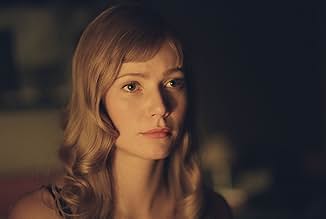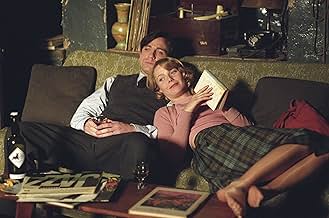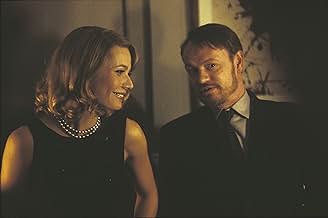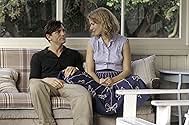IMDb रेटिंग
6.3/10
11 हज़ार
आपकी रेटिंग
अपनी भाषा में प्लॉट जोड़ेंStory of the relationship between poets Edward James "Ted" Hughes and Sylvia Plath.Story of the relationship between poets Edward James "Ted" Hughes and Sylvia Plath.Story of the relationship between poets Edward James "Ted" Hughes and Sylvia Plath.
- पुरस्कार
- कुल 1 जीत
फ़ीचर्ड समीक्षाएं
As a young woman, poetess Sylvia Plath meets the fiery Ted Hughes because of one of his poems catching her eye and deeply impressing her. So begins their life together that continues with marriage and the inevitable onset of domestication. As a woman this affects Sylvia more than it seems to affect Ted and she finds herself struggling to write as she balances home life with working as a teacher. Things are made worse by Ted, who has the first of many affairs with a student from Sylvia's class. As the pressures of family and children going to grow, so does Sylvia's mistrust of Ted and paranoia over his behaviour.
When a film is loudly disowned by the child of the subject you do have to approach it with a certain amount of caution and, although I'm not sure why Frieda Hughes took against it, I suspect it is because of the very event-based approach of this film. In a film that shows us how Sylvia was pushed down and had her talent smothered one way or another, it is ironic that the script does something similar by failing to let us understand her poetry, her character or her talent. Instead what we are treated to is a story that shows her being oppressed and beaten down. Now I accept that this is supposedly essentially true, but by ignoring her fame I imagine that this could be seen as just piling more on top of the lot she had while she was alive. It also has the effect of turning a biopic into a relationship melodrama that slowly plods along, pushing Plath down until the ending we know is coming. It is still reasonably interesting but I didn't feel that I learnt anything specific about Plath other than the fact that she was with a man that wasn't particularly good for her which puts her in the company of a lot of woman; the difference between her and them was her poetry but the film doesn't seem too bothered about this.
The upside of this is that Paltrow is best in the role when she is being downtrodden and oppressed; when she is asked to do something other than this then she seems less sure of her character and is less able at least depressed she seems to know what is required of her. Craig is as reliable as usual and does well even if his character is not exactly layered or that complex. The support is mostly pretty good, although I didn't understand what attracted Michael Gambon to such a small role, but the film pretty much belongs to Paltrow, who takes to her downtrodden well.
Overall this was an average film that plays out like a relationship melodrama and didn't do much to help me understand the character or talent of Plath other than showing me what happened within her relationship with Hughes. I can understand why her children objected to this simplification of their mother because personally I would not want to be remembered for my suffering if I had such talent. Paltrow and Craig are both good with the relationship material but the film should have been much better than it was.
When a film is loudly disowned by the child of the subject you do have to approach it with a certain amount of caution and, although I'm not sure why Frieda Hughes took against it, I suspect it is because of the very event-based approach of this film. In a film that shows us how Sylvia was pushed down and had her talent smothered one way or another, it is ironic that the script does something similar by failing to let us understand her poetry, her character or her talent. Instead what we are treated to is a story that shows her being oppressed and beaten down. Now I accept that this is supposedly essentially true, but by ignoring her fame I imagine that this could be seen as just piling more on top of the lot she had while she was alive. It also has the effect of turning a biopic into a relationship melodrama that slowly plods along, pushing Plath down until the ending we know is coming. It is still reasonably interesting but I didn't feel that I learnt anything specific about Plath other than the fact that she was with a man that wasn't particularly good for her which puts her in the company of a lot of woman; the difference between her and them was her poetry but the film doesn't seem too bothered about this.
The upside of this is that Paltrow is best in the role when she is being downtrodden and oppressed; when she is asked to do something other than this then she seems less sure of her character and is less able at least depressed she seems to know what is required of her. Craig is as reliable as usual and does well even if his character is not exactly layered or that complex. The support is mostly pretty good, although I didn't understand what attracted Michael Gambon to such a small role, but the film pretty much belongs to Paltrow, who takes to her downtrodden well.
Overall this was an average film that plays out like a relationship melodrama and didn't do much to help me understand the character or talent of Plath other than showing me what happened within her relationship with Hughes. I can understand why her children objected to this simplification of their mother because personally I would not want to be remembered for my suffering if I had such talent. Paltrow and Craig are both good with the relationship material but the film should have been much better than it was.
It's 1956 Cambridge, England. American student Sylvia Plath (Gwyneth Paltrow) is dismissed by the high-minded poetry review. She is taken with fellow student Edward Ted Hughes (Daniel Craig)'s poems. They eventually get married. He has many female fans and she suspects his infidelity. They have two children. She struggles to write under successful Ted's overwhelming shadow. She falls into depression and eventually commits suicide in 1963.
It's a downbeat biopic that bothers on old-fashion melodrama. Paltrow is lovely but I figured Plath would be more fragile even before her breakdown. Daniel Craig has the prerequisite charisma. The movie is very flat. It is unable to elevate the material into something more dramatic. This is a long drawn out character study that isn't terribly interesting.
It's a downbeat biopic that bothers on old-fashion melodrama. Paltrow is lovely but I figured Plath would be more fragile even before her breakdown. Daniel Craig has the prerequisite charisma. The movie is very flat. It is unable to elevate the material into something more dramatic. This is a long drawn out character study that isn't terribly interesting.
When I rented this movie, I thought it would be about Sylvia's entire life, or at least starting from her days at Smith College. I didn't realize that her marriage with Ted Hughes would be the entire storyline. I think this movie would've been better had they shown more about Plath's life BEFORE Ted Hughes. For people who don't really know much about Plath and her poetry, understanding her life before Hughes would've made the film much more substantial. The audience has to realize that Plath led a very, very hard mental life even before she met Hughes, and her ideas for her poetry and 'The Bell Jar' mostly originated from her bachelorette days. She never recovered from her depression as a young woman and it branched out still as she married Hughes. Without understanding Plath from the beginning hinders the audience from understanding Plath at all.
I feel like the movie only told half the story. Plath's mind was beautiful, colorful, and brilliant. It wasn't just about the jealousy, depression, and paranoia. Putting her works on the back burner really took away most of this movie. I would've liked to see more narration by Plath and giving us an insight into her mind, the way her unabridged journals do. However, I really enjoyed the dialogue of this movie; the lines were poetic and beautiful.
Unfortunately, I am still waiting for a better Sylvia Plath movie. I recommend people to read 'The Bell Jar' and 'Ariel' before or after seeing this movie though.
I feel like the movie only told half the story. Plath's mind was beautiful, colorful, and brilliant. It wasn't just about the jealousy, depression, and paranoia. Putting her works on the back burner really took away most of this movie. I would've liked to see more narration by Plath and giving us an insight into her mind, the way her unabridged journals do. However, I really enjoyed the dialogue of this movie; the lines were poetic and beautiful.
Unfortunately, I am still waiting for a better Sylvia Plath movie. I recommend people to read 'The Bell Jar' and 'Ariel' before or after seeing this movie though.
"Sylvia" is not quite just a slow, straightforward bio-pic of poet Sylvia Plath. While screenwriter John Brownlow has a long background in TV documentaries, director Christine Jeffs has previously made a young woman's mental disquiet dreamily visual in the superb New Zealand film "Rain."
She has her "Rain" cinematographer John Toon bathe the entire film in a nostalgia-tinged amber glow, like the extended flashbacks to the young lovers in the Australian film "Innocence." I think the point is to determinedly place Plath and her husband poet Ted Hughes into their specific time at the cusp before "The Feminine Mystique" put a name to Plath's frustrations and contradictions as a Fulbright scholar - experimental poet turned wife and mother who ultimately turned on herself. ("Mona Lisa's Smile" with Julia Roberts will evidently be dealing with a parallel time and place in a much more Hollywood interpretation.)
As played alternatively languid and aggressive by Gwyneth Paltrow and a Byronic Daniel Craig, they are an actively sensual couple, but notably not Bohemian. They are part of an intellectual but not counter-cultural set. While they are competing for editors' accolades and print space, she's setting her hair, arranging her pearls and cleaning house, like a proper Smith graduate of the time who is perfectly at home visiting her Boston mother (played by real-life mom Blythe Danner) and amidst the books of her late bee scholar father (My friend the PhD in English tells me that the original film title of "The Bee-Keeper's Daughter" would have been fraught with much more significance about Plath's obsessions.)
Hughes celebrates his first big break by asking her to marry him and kids follow one after the other; when they need money he looks to write a children's series for the BBC. Yes, she gets more and more difficult and paranoid, but he is having affairs (and another child) as he attracts more fawning women acolytes.
An earlier suicide effort is referenced a couple of times yet her increasingly heightened mental imbalance as shown here could be post-partum depressions or a Laingian response that insanity is the only rational response to an insane, unfair world. (The film does not seem to side with her loyalist cult which Margaret Atwood satirizes in "The Blind Assassin").
It is always difficult to show a writer at work, but I would have liked to hear more of her poetry than a few passing sentences.
Gabriel Yared's music is lovely and unsentimental.
She has her "Rain" cinematographer John Toon bathe the entire film in a nostalgia-tinged amber glow, like the extended flashbacks to the young lovers in the Australian film "Innocence." I think the point is to determinedly place Plath and her husband poet Ted Hughes into their specific time at the cusp before "The Feminine Mystique" put a name to Plath's frustrations and contradictions as a Fulbright scholar - experimental poet turned wife and mother who ultimately turned on herself. ("Mona Lisa's Smile" with Julia Roberts will evidently be dealing with a parallel time and place in a much more Hollywood interpretation.)
As played alternatively languid and aggressive by Gwyneth Paltrow and a Byronic Daniel Craig, they are an actively sensual couple, but notably not Bohemian. They are part of an intellectual but not counter-cultural set. While they are competing for editors' accolades and print space, she's setting her hair, arranging her pearls and cleaning house, like a proper Smith graduate of the time who is perfectly at home visiting her Boston mother (played by real-life mom Blythe Danner) and amidst the books of her late bee scholar father (My friend the PhD in English tells me that the original film title of "The Bee-Keeper's Daughter" would have been fraught with much more significance about Plath's obsessions.)
Hughes celebrates his first big break by asking her to marry him and kids follow one after the other; when they need money he looks to write a children's series for the BBC. Yes, she gets more and more difficult and paranoid, but he is having affairs (and another child) as he attracts more fawning women acolytes.
An earlier suicide effort is referenced a couple of times yet her increasingly heightened mental imbalance as shown here could be post-partum depressions or a Laingian response that insanity is the only rational response to an insane, unfair world. (The film does not seem to side with her loyalist cult which Margaret Atwood satirizes in "The Blind Assassin").
It is always difficult to show a writer at work, but I would have liked to hear more of her poetry than a few passing sentences.
Gabriel Yared's music is lovely and unsentimental.
What makes poetry a special art form? Answers might include bringing together extremes of joy and despair within a couple of lines, offering an alternative to rational thought, enriching our outlook and understanding in ways that prose would struggle to equal. Poetry can provide a single phrase or sentence that is easily remembered and somehow unlocks difficult-to-express inner states, just as a song can (and poetry is the basis of songs). It offers a freedom of expression where you don't need to explain every aspect of what you are saying - it urges the listener to grasp a semi-spoken truth or idea.
That's my rough guess. I've got over 40 books of poetry on my bookshelf at the last count, yet I'm no literary expert and appreciate poetry in a very simple way. Most people might agree that poetry offers something special, so a film celebrating the life of a famous poet might be expected to bring us a glimmer of that something.
Sylvia Plath has been championed not only as a poet but as a sort of feminist' a cry on behalf of women treated as a commodity, subjugated by an unfair male-dominated system. Cast in the lead role, Gwyneth Paltrow's Plath focuses much attention on how downtrodden she was, chained to two children, overshadowed by a brilliant and celebrated Ted Hughes, struggling with bitterness, jealousy, mental instability and a less than attractive persona. We also get the occasional poetic outburst, from who-can-recite-poetry-fastest undergrad shenanigans to romanticised performances of Chaucer (addressed to an audience of watching cows whilst floating downstream in a boat). All punctuated with soft-focus shots of a naked Plath/Paltrow, hysterical and often violent outbursts at Hughes, and scenes of a generally uninteresting and uninspiring life of moderate wretchedness. The only thing that distinguishes Sylvia from the now-unfashionable kitchen sink drama is that its central character is called Sylvia Plath.
So is the film worthy of the title? In A Beautiful Mind, we learnt of the joy of mathematics, Lunzhin Defence championed the addictive mysteries of chess, and Dead Poets Society made us lift our eyes to literary horizons that could inspire the dullest of minds. Sylvia was limited, perhaps, by the refusal of her daughter to allow much of Plath's poetry to be used in the film but, for whatever reason, it has failed to be more than a rather humdrum biopic. It offers little insight into her poetry or the magic of poetry generally, and adds little of interest about the historical figure that doesn't apply to millions of women. If any deep philosophical statement can be drawn from this, the film certainly doesn't make it, poetically or otherwise. Sadly, it would seem that the words of Sylvia Plath's daughter almost became a self-fulfilling prophecy: "Now they want to make a film . .. They think I should give them my mother's words . . . To fill the mouth of their monster . . . Their Sylvia Suicide Doll." Whilst not quite an empty doll, Sylvia is maybe an arm or leg short of a manikin.
That's my rough guess. I've got over 40 books of poetry on my bookshelf at the last count, yet I'm no literary expert and appreciate poetry in a very simple way. Most people might agree that poetry offers something special, so a film celebrating the life of a famous poet might be expected to bring us a glimmer of that something.
Sylvia Plath has been championed not only as a poet but as a sort of feminist' a cry on behalf of women treated as a commodity, subjugated by an unfair male-dominated system. Cast in the lead role, Gwyneth Paltrow's Plath focuses much attention on how downtrodden she was, chained to two children, overshadowed by a brilliant and celebrated Ted Hughes, struggling with bitterness, jealousy, mental instability and a less than attractive persona. We also get the occasional poetic outburst, from who-can-recite-poetry-fastest undergrad shenanigans to romanticised performances of Chaucer (addressed to an audience of watching cows whilst floating downstream in a boat). All punctuated with soft-focus shots of a naked Plath/Paltrow, hysterical and often violent outbursts at Hughes, and scenes of a generally uninteresting and uninspiring life of moderate wretchedness. The only thing that distinguishes Sylvia from the now-unfashionable kitchen sink drama is that its central character is called Sylvia Plath.
So is the film worthy of the title? In A Beautiful Mind, we learnt of the joy of mathematics, Lunzhin Defence championed the addictive mysteries of chess, and Dead Poets Society made us lift our eyes to literary horizons that could inspire the dullest of minds. Sylvia was limited, perhaps, by the refusal of her daughter to allow much of Plath's poetry to be used in the film but, for whatever reason, it has failed to be more than a rather humdrum biopic. It offers little insight into her poetry or the magic of poetry generally, and adds little of interest about the historical figure that doesn't apply to millions of women. If any deep philosophical statement can be drawn from this, the film certainly doesn't make it, poetically or otherwise. Sadly, it would seem that the words of Sylvia Plath's daughter almost became a self-fulfilling prophecy: "Now they want to make a film . .. They think I should give them my mother's words . . . To fill the mouth of their monster . . . Their Sylvia Suicide Doll." Whilst not quite an empty doll, Sylvia is maybe an arm or leg short of a manikin.
क्या आपको पता है
- ट्रिवियाFrieda Hughes, Sylvia Plath's daughter and literary executor, didn't allow the producers to access to her mother's poetry. She also publicly denounced the project in a published poem of her own.
- गूफ़When Ted and Sylvia are in bed together and she is discussing her suicide attempt, you can clearly see Daniel Craig's tattoo through the make up on his shoulder and Gwyneth Paltrow's hair net to which her wig is attached.
- भाव
Sylvia: [to Ted, after making love] We're not even two people. Even before we met, we were just these two halves, walking around with big gaping holes in the shape like the other person. And when we found each other we were finally whole. And then it was as if we couldn't stand being happy so we ripped ourselves in half again.
टॉप पसंद
रेटिंग देने के लिए साइन-इन करें और वैयक्तिकृत सुझावों के लिए वॉचलिस्ट करें
- How long is Sylvia?Alexa द्वारा संचालित
विवरण
बॉक्स ऑफ़िस
- बजट
- £70,00,000(अनुमानित)
- US और कनाडा में सकल
- $13,15,498
- US और कनाडा में पहले सप्ताह में कुल कमाई
- $58,940
- 19 अक्टू॰ 2003
- दुनिया भर में सकल
- $29,17,393
- चलने की अवधि
- 1 घं 50 मि(110 min)
- रंग
- ध्वनि मिश्रण
- पक्ष अनुपात
- 2.35 : 1
इस पेज में योगदान दें
किसी बदलाव का सुझाव दें या अनुपलब्ध कॉन्टेंट जोड़ें




































